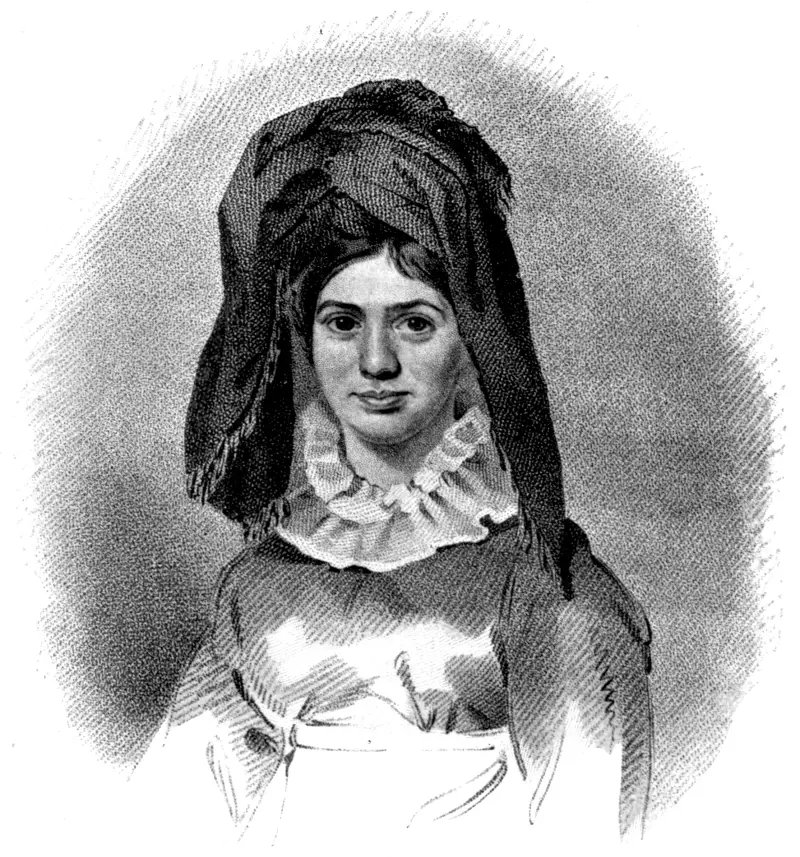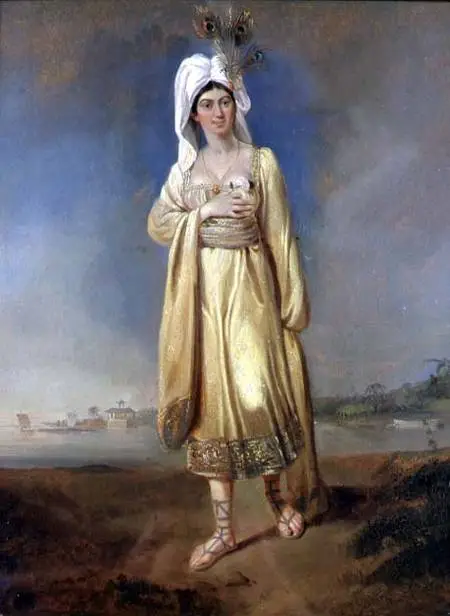The Princess Who Fooled the English

Princess Caraboo, image from Devonshire Characters and Strange Events by S. Baring-Gould, 1908.
On April 3, 1817, in Almondsbury, a small village a few miles north of Bristol, a confused girl appeared out of nowhere. She was wearing a shabby dress with a shawl, a turban, and she seemed exhausted, as if she had just returned from a long journey. The lady had a small bundle of belongings, a bar of soap and toiletries. The villagers were puzzled by the fact that she spoke in a language that no one could understand.
And, of course, they became interested in her. Since the locals mistook her for some kind of beggar, they brought her to the overseer assigned to the local almshouse. He was suspicious of the foreign visitor due to the situation after the Napoleonic Wars, so he sent her to the luxurious country residence of Samuel Worrell, a local judge.
Princess Karabou
The judge called his Greek valet, who had considerable knowledge of Mediterranean languages, to try to translate what the woman was saying. But there was no point. They even tried to ask her for documents, using sign language for this, but the woman simply pulled out a few coins from her pockets.
Worrell was skeptical, but his wife felt more fascinated than alarmed. She sent the mysterious guest to spend the night at a local hotel. While there, the latter refused any decent food and only asked for a cup of tea. Then she said a prayer, covering her eyes with her hand.
The hotel workers thought she recognized a picture of a pineapple hanging on the hotel wall. Therefore, the locals decided that she might have come from some distant tropical country. And when she was shown into her room for the night, she first stared strangely at the bed, then curled up and fell asleep on the floor.
The next day Mrs. Worrell called the lady back to her residence. Once there, the stranger pointed to herself, repeatedly saying the word “Karabu.” Mr. Worrell was already tired of this, and he decided that she was just putting on a show, so he arrested her, declaring her a tramp.
Caraboo (as they called her) spent some time in St Peter's Hospital for Vagrants in Bristol until Mrs Worrell intervened and transferred her back to her place.
By that time they had already spread news about a mysterious woman from Almondsbury, and dozens of curious locals went to visit her, often bringing with them speakers of different languages. Even though she had several visitors over the course of 10 days, still no one could understand her language. Until one Portuguese sailor showed up.
Glory
Hearing about the unusual stranger, the Portuguese sailor Manuel Einesso, who happened to be in Bristol, visited the Worrells' office to meet with Karabu. A sailor who traveled everywhere claimed that he recognized the colloquial language of Karabu, which is spoken in Sumatra. He immediately began to translate the unusual history girls
Karabu was not a beggar. She was a princess from the island of Yavasu in the Indian Ocean. She explained to Einesso that she had been kidnapped by pirates and held captive, but managed to escape when she jumped overboard in the Bristol Channel. Then she wandered through the countryside for six weeks before she reached Almondsbury.
That was all Mrs. Worrell needed to hear: she belonged to the royal family, and it would be a great honor for the wife of a judge to host the lady. The guest was provided with a tailor who made her clothes. The next 10 weeks were eventful, with parties and dinner parties held in Karabu's honor, and members of high society fawned over her, amazed by the story of a penniless beggar who eventually turned out to be a princess.
Karabu constantly supplemented and changed her story, compiled a dictionary with several dozen words, and talked about the customs of her people. The girl did not get confused in her incomprehensible words, did not make mistakes in accents. A man named Dr. Wilkinson wrote in his diary: “Nothing has yet happened that could arouse the slightest suspicion regarding Karabu.”
But nothing lasts forever.

"Princess Caraboo", Edward Bird, 1817
Discrediting the myth
News of Princess Caraboo constantly spread, and a few weeks later a description of her appeared in the local newspaper. A copy reached Mrs. Neal, the owner of a local boarding house, who immediately recognized Karaba, but not as the kidnapped Javanese princess.
Mrs. Neal believed that Caraboo was actually Mary Baker, her former guest. She is the daughter of a shoemaker from a small village 70 miles from Bristol. According to Mrs. Neal, the mysterious Princess Caraboo was a hoax.
Mrs Worrell soon heard about the report, but was initially skeptical of Mrs Neale's version. So she asked Princess Caraboo to accompany her to Bristol to have her portrait painted there. But in fact, Mrs. Worrell intended to meet Mrs. Neal in person, and after a short conversation she was convinced that the “Princess Caraboo” was indeed an impostor.
Later, the repentant Karabu, aka Baker, admitted that she had been deceiving everyone for several months.
Mary Baker was from Devon, where she was born in 1791. When she was young, she quarreled with her parents, from whom she ran away. She held several jobs throughout southern England before becoming impoverished and begging on the streets of Bristol by the early 1810s.
There she realized that by posing as a foreigner, she gained more sympathy (and therefore money) from the public. She created the character "Princess Caraboo" while at Mrs. Neal's guest house to entertain the children. And then she used it to deceive the residents of Almondsbury. And no princess island actually existed. It’s strange that they didn’t figure out Mary earlier - the girl had a clearly European appearance.
When news of the revelation appeared in the newspaper, the press again paid attention to the girl. Instead of this being turned against her, Baker was actually made into a heroine. Most journalists spun the story, celebrating the triumph of the working class over the aristocracy. A poorly educated, downtrodden girl, thanks to her own intelligence and audacity, was able to penetrate the upper echelons of high society.
Even Mrs. Worrell appreciated Baker’s success. She accepted the girl's true story with compassion and decided to continue to help Mary improve her life and even raised money for her so that by 1817 she could move to Philadelphia and start over with a clean slate.
Arriving in America, Baker was able to capitalize on her notoriety and staged a short stage show in New York City with her character Princess Caraboo. She later returned to England and staged a similar show in London, but it was only a minor success because the public was no longer interested in Caraboo.
In the late 1820s, census records showed that Baker, now a widow named Mary Burgess, had returned and settled somewhere near Bristol, selling leeches to a local hospital. She continued to practice this craft for 30 years and then died of a heart attack in 1864 or 1865.
These days, Mary could have become a writer, actress or director - her imagination knew no bounds. By the way, in 1994, the English film “Princess Caraboo” was released about her.
As for the Portuguese sailor who forged the translation of her story, it is still a mystery how he could recognize the made-up language?
Perhaps it was a pure coincidence. Maybe he was her accomplice; some languages say that they had a love affair, and she even gave birth to his child.
In any case, this story is very beautiful and interesting.
Yes, there are hundreds of such stories about scammers and fraudsters who pretend to be others, and they appear even now - in the era of digitalization. People pretend to be football agents, relatives of celebrities, aristocrats, and many fall for it. What can I say - as long as there are such people, life will not be boring.
Information